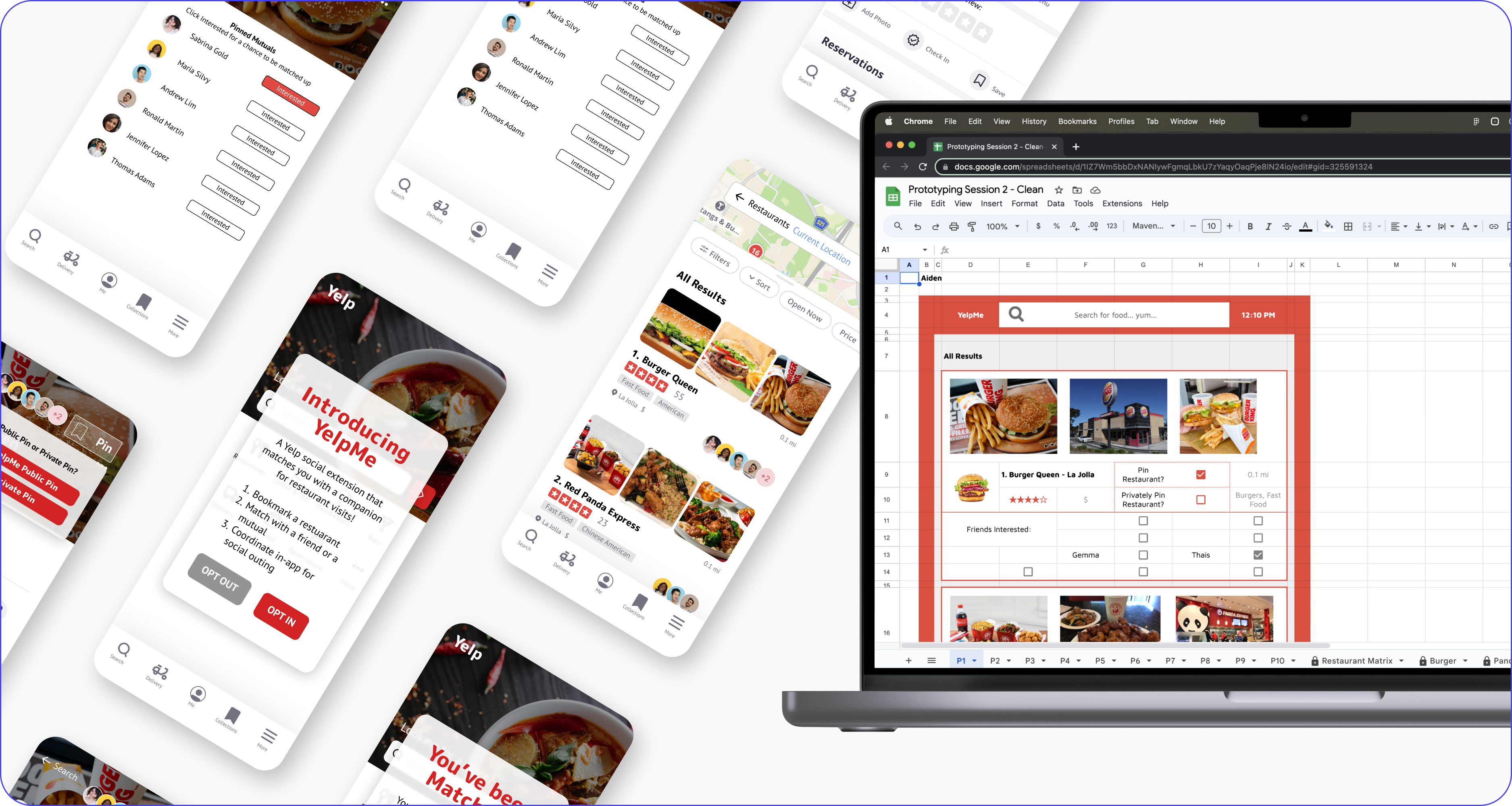
Overview
Role
Project Lead, UX/UI Designer, Prototype Developer
Time
3 months - 2022
Program
COGS 123: Social Computing @ UC San Diego
Deliverables
High fidelity clickable prototype and team case study
Background
Why does social eating matter?
When people are eating:
- Their moods are heavily affected depending on who they're eating with and if they're eating with others.
- Social eating has been shown to build and reinforce relationships.
- Research indicates that eating with others is correlated with better mental health and happiness.
Why Yelp?
Although Yelp has a variety of information users can access, the platform offers no way for users to coordinate with one another using that information.
84.4% of our survey respondents use Yelp to find restaurants...but only 9.4% use Yelp to send recommendations to friends.
Despite the benefits of social eating, many don't participate due to the difficulty of planning/scheduling.
Problem
How might we streamline the process of planning social eating to optimize connectivity between both weak and strong ties?

Due to the social ramifications of COVID-19, it is harder than ever to coordinate hangouts. This leads to an increase in people eating alone.
However, if we can integrate a social experience into existing applications like Yelp, it may make it easier to schedule in-person hangouts and form better connections.
We aimed to create an experience that went beyond the bookmark on Yelp.
Solution
Introducing YelpMe, our new add-on social feature!
My teammates and I developed the prototype below after two rounds of user testing. The screens demonstrate key design features to facilitate social eating between friends and acquaintances:
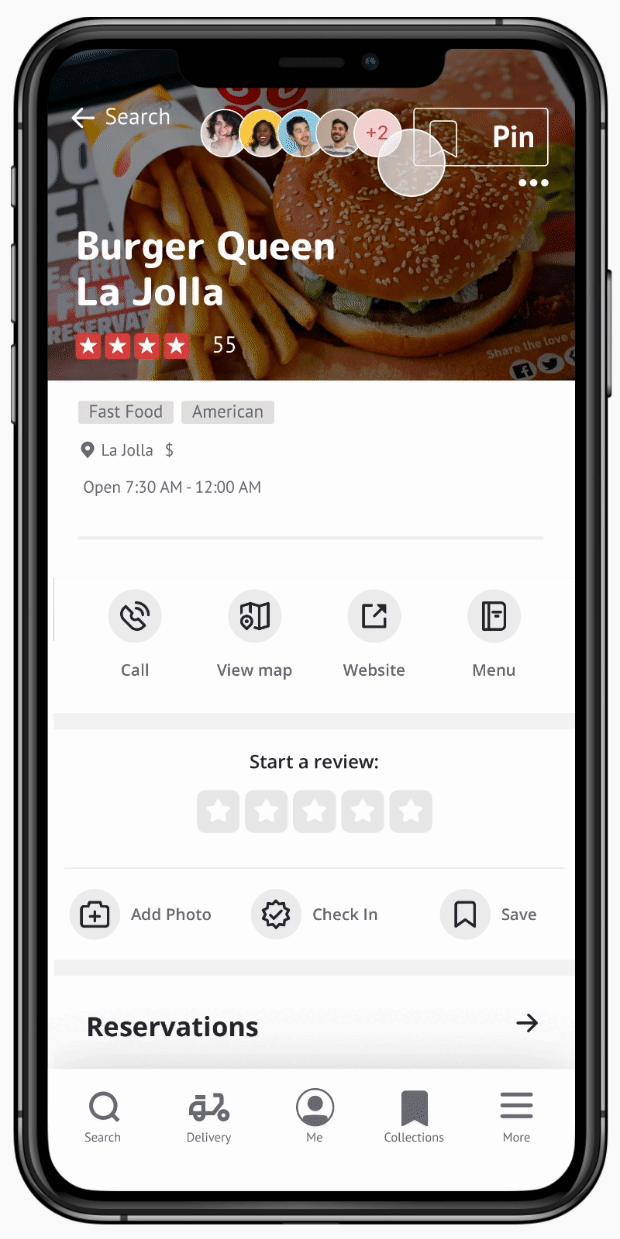
Public/private restaurant pins
You can determine for yourself if you'd like to meet up with others at specific locations, or if you would rather keep your interests private.
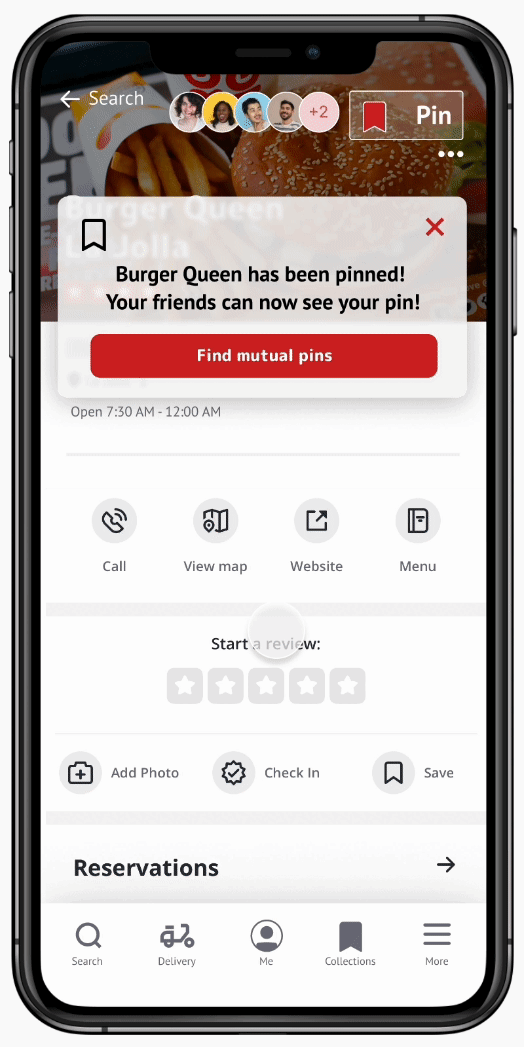
Indicate interest in "matching" with mutuals
Once you publicly pin a location, you can see other friends and acquaintances who have also publicly pinned the same place, and can indicate interest in meeting up with them.
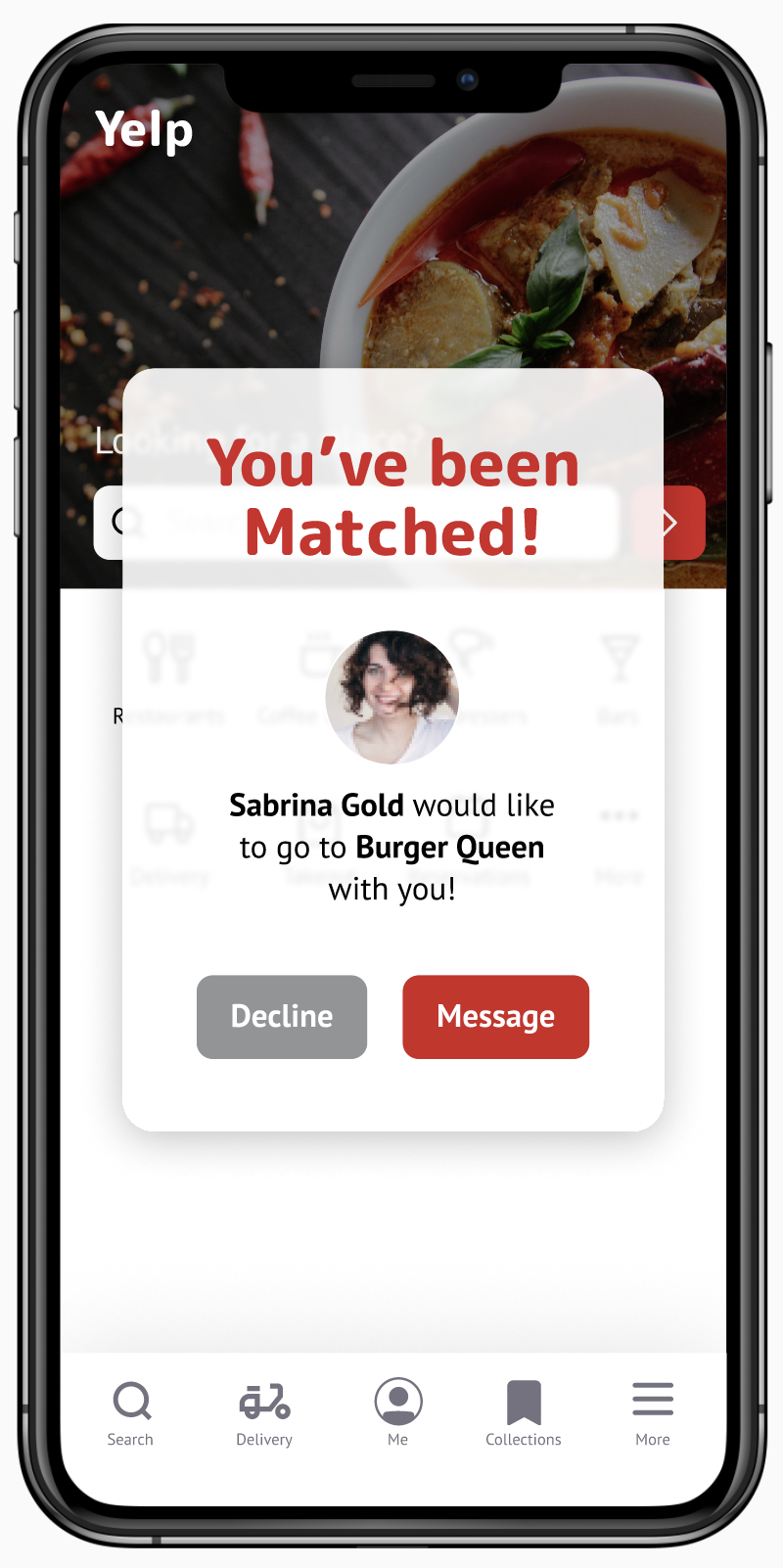
Get matched with friends & acquaintances
If you and a friend indicate a mutual interest in meeting with one another, you are prompted to coordinate with each other to hang out.
Check out our clickable prototype!
Deep Dive
User Research
We surveyed 32 users to gauge their attitude towards food-related decision-making and scheduling. Our users were taken from convenience sampling (primarily university students).
- 50% of respondents did not want to meet new people for social eating. Within that group, 63% said it is due to social discomfort
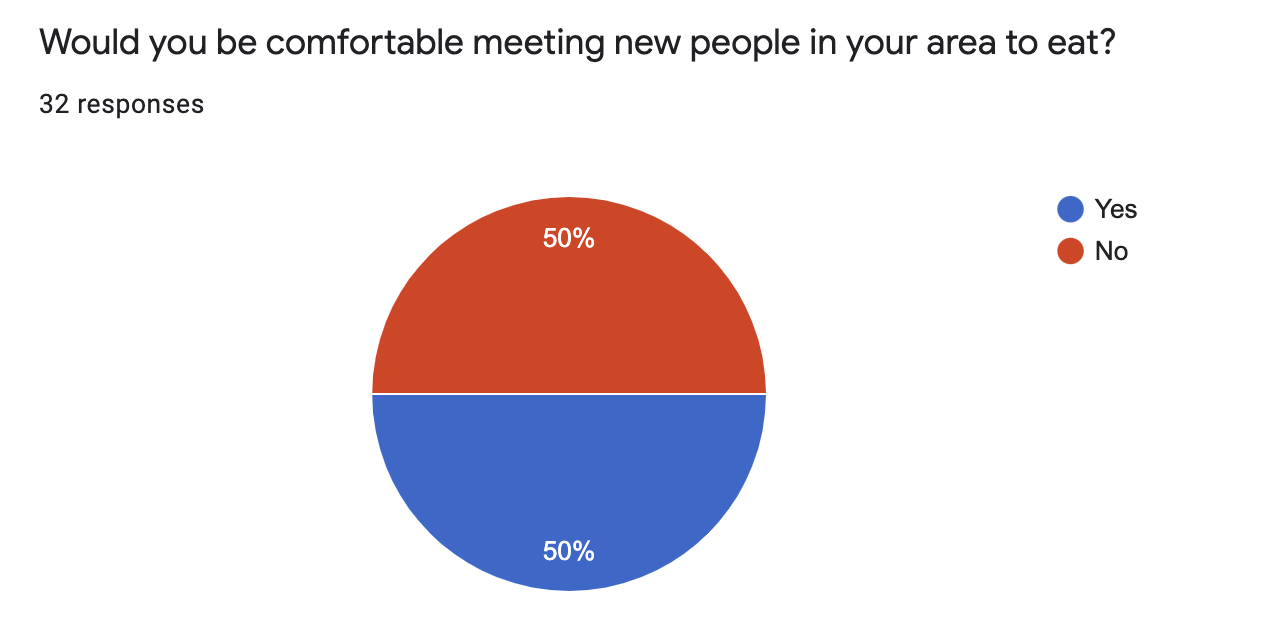
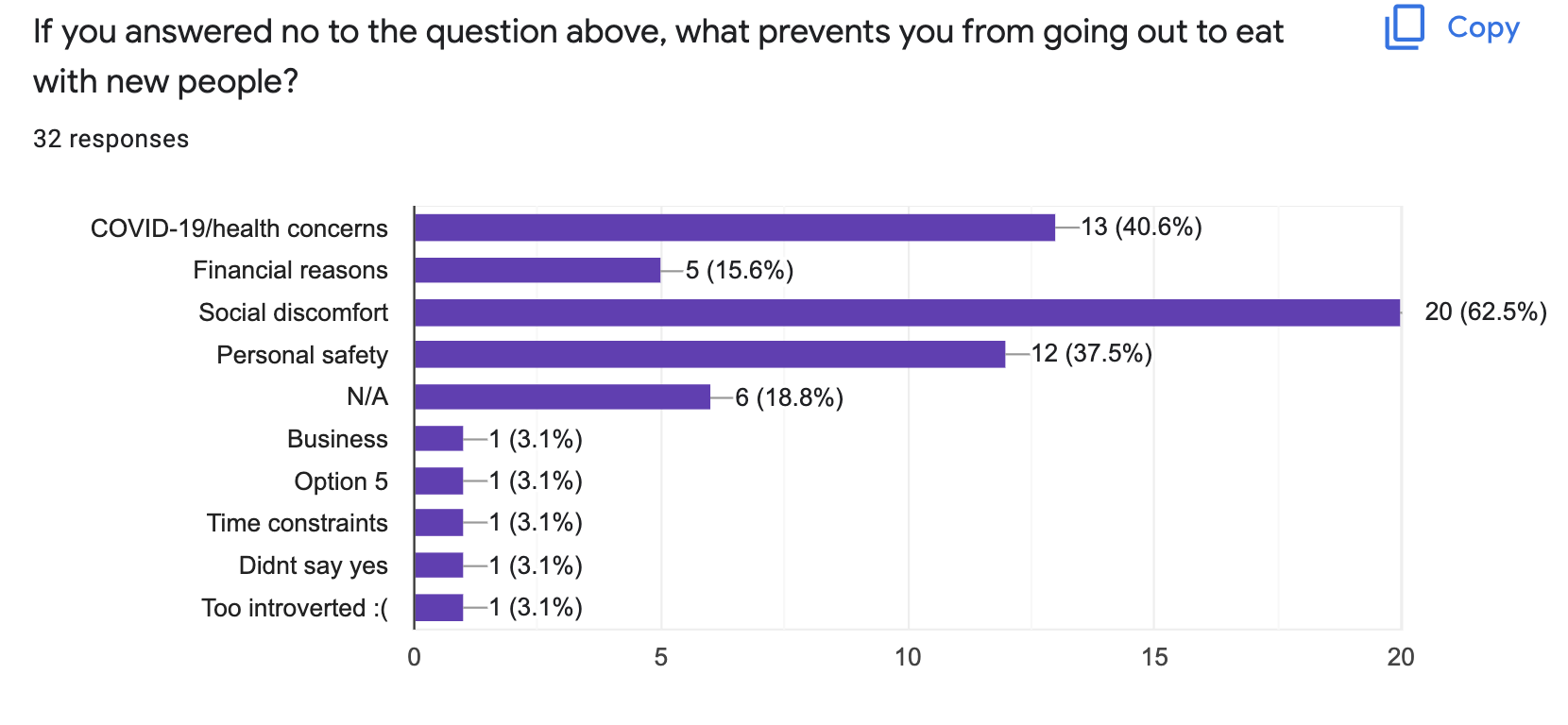
- Social eating overall is popular amongst friends, but co-location is difficult to work with when organizing
- Yelp users utilize it for information seeking, but there is a missed opportunity for social components
Our Findings
Ride with the squad, eat with the squad.
People would rather eat with people they know over strangers.
Co-location? More like no location!
Co-location features are popular but difficult to implement in a classroom setting.
Yelp needs some help...
Yelp can be improved with social features to extend their capabilities.
Lo-Fi Prototype - Testing
User Flows
After getting to know our users better and determining our product goals, we created a user flow to help us guide our iterative process and explore our design space with a shared mental model.

For our user testing, we provided the same social setting for participants during our prototyping sessions:
"You are a Yelp user, and you want to check out new restaurants to eat at! You are also looking for a companion to eat with you. Whether this is a person you know very well or someone who you vaguely know… it's up to you!"
User Testing
Our participants comprised of two other teams in the class. Users in this prototyping session were told that they were all "mutuals," meaning everyone had weak ties with each other already. However, their teammates were considered their close friends.
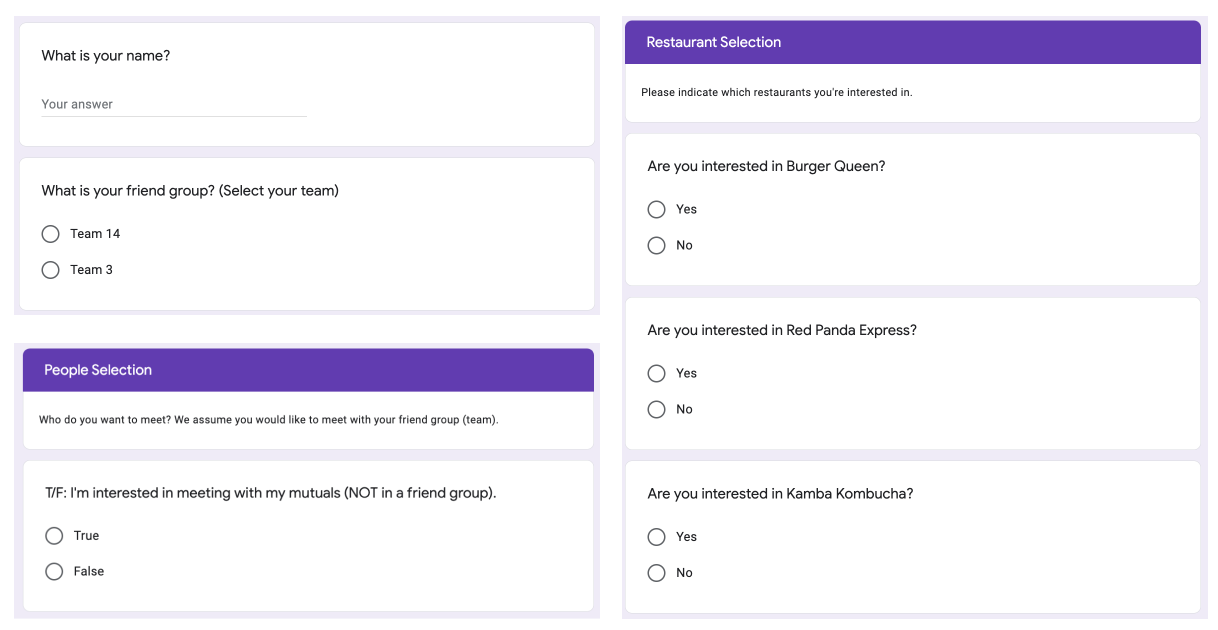
The backend on Google Sheets was performed synchronously and manually using a “Wizard of Oz” technique to simulate social interaction.

Based on each user's response on the form, they would receive a message from us via private Zoom chat:
“[Name] has just pinned the same restaurant! Set up a meeting time?”
“[Name], [Name], … have just pinned the same restaurant! Set up a meeting time?”
The user would not receive a message if there was no mutual/teammate that selected the same restaurants and meeting preferences as them. Based on the message(s) received, they can determine if they want to make a “plan” to meet at their preferred restaurant via Zoom Chat.
Lo-Fi Prototype - Feedback
We discovered potential concerns and improvements through our post-prototyping feedback form:
“It may be awkward to get food with weak ties 1-on-1 if I'm not intending to develop a deeper bond with them.”
↓
How can we give users more choice in who they want to meet up with?
“Definitely focus on scenario testing in order to prevent any issue with non-matches for food meetups.”
↓
How do we engage users who weren't/don't want to be matched?
Our feedback also supported our intended purpose for YelpMe: an extension that would better support and build stronger relationships between a user's connections, primarily amongst weak ties.
“I think it's a nice extension on Yelp to get a more social experience. I would see this idea as a gateway to make weak ties into a stronger relationship (become a way to create a friendship).”
“Close friends, I can just text with my friends on a social media app that we use regularly. For weak ties, I may not share social media with them so... I would be more inclined to use YelpMe for this.”
The next step was to refine our prototype to replicate the intended experience on Yelp.
↓
How can we make the backend more automated in our next prototype?
Hi-Fi Prototype - Testing
After considering user feedback, we developed a high fidelity, automated prototype of YelpMe.
As I had the most coding experience in the team, I single-handedly scripted this prototype to imitate the intended experience while limited by the capabilities of Google Sheets.
The prototype can be used in 4 simple steps!
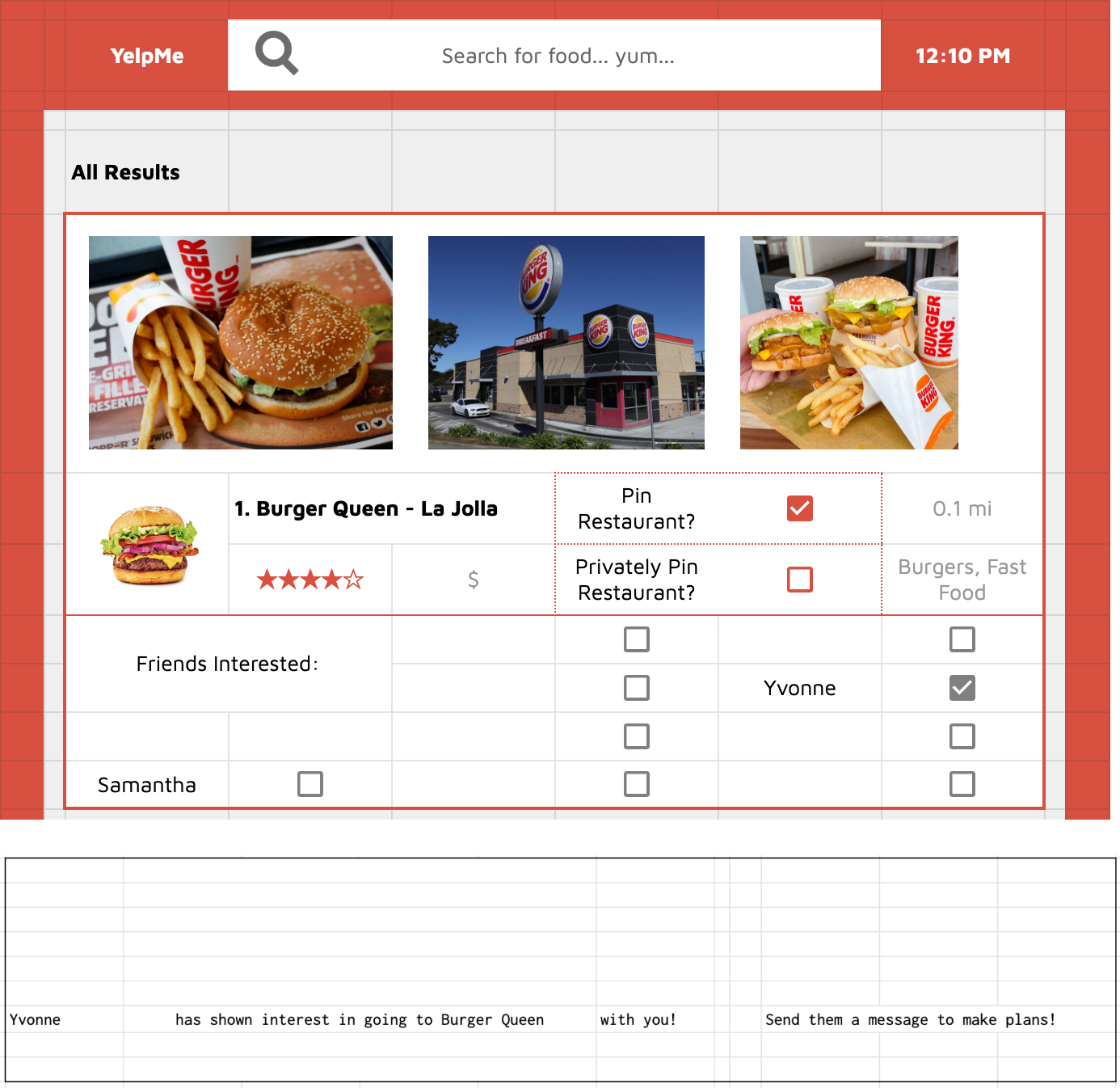
- You pin restaurants you're interested in. You can choose to privately pin as well.
- If one of your connections is interested in the same restaurant, their name will be under “Friends Interested”. You can check the box next to their name to indicate interest.
- If they also indicated interest, you will get a notification that they want to meet with you at the bottom of the Google Sheet.
- You now know who is interested in meeting up and can coordinate!
You have publicly pinned Burger Queen, and can see that Samantha and Yvonne did the same. You're interested in meeting with Yvonne, so you check her name. Yvonne is also interested in going with you to Burger Queen, so at the bottom of the file it generates a statement.
For this prototype, we wanted to give users more control over who they would meet up with, and ensure both parties were mutually interested in meeting up to avoid awkward situations.
Here, we implemented the "privately pin” feature for users who do not want to share certain restaurants they're interested in.
I used multiple matrices to keep track of restaurants users pinned and to calculate when users indicated mutual interest. Using this method, we could notify participants in real time when others matched with them.

This matrix keeps track of what restaurants users are interested in and sends this information back to users' screens by showing other interested users' names under the restaurant.

In this matrix depicting users' interest in going with each other to Limegrass, Samantha and Angela both indicated an interest in each other, so they would both get a notification.
Hi-Fi Prototype - Feedback
With our new high-fidelity prototype, we conducted user testing again. We split the session into two groups of 10 participants.
“It is an easy, lower-stakes/expectation on meeting people you kind of know.”
“I think it is an interesting idea since it shows you who is interested to go to which eating place with you. I would use it with weaker ties too to learn more about someone.”
“For weak ties, I may be more inclined to use it because I feel like there are lower stakes involved. We both kind of know each other and we can decide if we feel willing to just try and hang out.”
Many user's liked the low stakes aspect of interaction on YelpMe, and indicated a great interest in using something like YelpMe for getting to know their weaker ties better, as opposed to close friends. All users indicated that this design was novel.
Conclusions
Social Eating is Polarizing
Users responded in a variety of ways to our prototype:
“I'm the type of person who prefers eating alone than eating with weak ties... I feel a little bit awkward when eating with unfamiliar [people.]”
“I feel like we can use it for strangers as well.”
As we went into our final prototype, we wanted to make sure that YelpMe remained a comfortable experience for all kinds of users.
Private and Public Pinning: The Next Novel Social Feature?
“[Flourish] out the private pin next time. Great second round of prototyping!”
“Nice prototype. I appreciate having a private pin as an option.”
Private pinning is a hidden feature that might be useful in several contexts. It has intriguing implications in online social settings, as there can be a myriad of reasons why you would want to pin a location for yourself vs. others.
I'm honored to share that our hi-fi prototype was chosen by the professor as an example for future students in COGS 123!
Final UI
After understanding the functionality behind our Yelp extension, our team made a Figma prototype imitating the Google Sheets experience.
Our main goal was to translate the functions of our feature into Yelp's UI.
Next Steps
Once we completed our prototypes, we had a clear idea of how this extension could expand in the future:
- Indicating general interest in meeting up, rather than specific people
- Embed calendar integration (Google Calendar/Microsoft Outlook)
- Extend to non-restaurants (ie. various activities and locations also reviewed on Yelp)
Thank you!
Thank you to my wonderful teammates, who were an absolute delight to work with despite the challenges we faced. Go Team Buns and Peonies!
Additionally, thanks to the COGS 123 teaching team for helping us develop our project to it's full potential, as well as all of our peers and classmates who helped us with user testing!